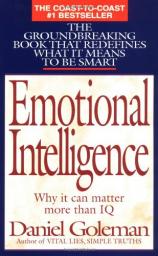Reading Group Guide
Discussion Questions
Emotional Intelligence

1. Emotional Intelligence proposes that empathy and other emotional skills can be taught--and that schools should teach students how to handle and express their emotions appropriately. However, a Time magazine cover story about emotional intelligence argued that, "The danger is that any campaign to hone emotional skills in children will end up teaching that there is a 'right' emotional response for any given situation." Do you believe it's appropriate--or possible--for schools to teach emotional skills to students? If parents don't teach these skills, and schools shouldn't, who should?
2. The book portrays a society suffering from a breakdown of emotional intelligence. It cites the following statistics: Violent crimes by young people are up by a factor of four over the past 20 years. Suicides have tripled among young people in the same period, and forcible rape has doubled. Though he acknowledges that factors such as poverty play a role in the creation of violent criminals, Dr. Goleman says, "Every time we read about another senseless murder, it's a sign of emotional intelligence gone awry." What current or recent events in the news strike you as possible examples of emotional illiteracy? Do you believe there's hope for improving our collective social life by teaching emotional skills to individuals?
3. Are women more emotionally intelligent than men? Dr. Goleman doesn't believe so. He finds that each gender has its emotional strengths and weaknesses. Women are trained to be more empathetic--thus, they are often better than men are at picking up "the subtle, unspoken emotional dimension" of communication. On the other hand, women are treated for depression at twice the rate men are. Men are often better at managing their moods--a key component of emotional intelligence. What other patterns of strength and weakness might be attributed to the sexes, respectively? Do you believe boys should be trained to be more aware of others' moods? Do you think girls could be given skills that would help them be more optimistic? Do you believe there are innate differences in the emotional capacities of the genders?
4. Contrary to popular wisdom, Emotional Intelligence argues that venting anger--by yelling, for instance--can cause more harm than good. The author believes catharsis has an undeserved popularity as a method of handling anger. He cites studies which show that the net effect of lashing out is to prolong rage rather than to end it. Do you think it's desirable--or possible--to avoid emotional displays of anger? In what other ways can extreme frustration be expressed? Have you ever regretted an unplanned outburst of rage? Ever seen a tantrum produce a desired result?
5. According to the author, emotions are impulses which compel us toward--or away from--various courses of action. "Formal logic alone can never work as the basis for deciding who to marry or trust or even what job to take; these are the realms where reason without feeling is blind." He believes that gut reactions and intuitions are more than mere momentary whims, that they are sophisticated calculations based on a quick-but-careful review of past experience. Are your important life decisions based more on rationality, or on an emotion-based "gut instinct?" Can you recall any occasion when an instantaneous decision reached by your emotional circuitry steered you right ... or wrong?
6. A previous bestselling book, The Bell Curve, asserts that one's intellectual capacities are fixed: The Bell Curve's authors claim there's no way to transcend the IQ you were born with. Emotional Intelligence defines intelligence more broadly, positing that there is an emotional brain which greatly influences the workings of the rational brain, that both contribute to one's level of intelligence, and that emotional skills can be improved on. Which view of intelligence do you find more valid, and why?
7. Tests of aspects of emotional intelligence, such as "The Marshmallow Test," have proven to be strong predictors of future success. Some four-year-olds who took "The Marshmallow Test" were able to restrain their desire for a treat in favor of a greater reward later. This triumph over the urge for immediate gratification turned out to have a far-reaching impact later in life. As high-school seniors, those who had "passed" the test "were more academically competent: better able to put their ideas into words, to use and respond to reason, to concentrate, to make plans and follow through on them, and more eager to learn. Most astonishingly, they had dramatically higher scores on their SAT tests." Given such evidence that emotional skills affect one's capacity for success, do you believe children should be given standardized tests which measure not just IQ, but also emotional intelligence?
8. The book offers compelling evidence that parents' degree of emotional skill goes far toward determining their childrens' level of emotional intelligence. Can you recall ways in which your parents enhanced or deterred the development of any of the five components of emotional intelligence (self-awareness; emotional control; self-motivation; empathy; handling relationships) in you or your siblings?
9. Empathy is a key component of emotional intelligence; sensitivity to others' feelings is a prerequisite to developing strong relationships. Researchers believe that 90% of emotional communication is non-verbal. What are some examples of unspoken cues people use to express their feelings?
10. Dr. Goleman says modern medical care often lacks emotional intelligence. "Medicine's inattention to the impact of emotions on illness neglects a growing body of evidence which indicates that emotional states can play a significant role in vulnerability to disease and in the course of their recovery." He claims that "there are many ways medicine can incorporate new knowledge about the impact of emotions on health into its view of patient care." Have you, or has someone you know, experienced emotional insensitivity at the hands of medical professionals? How far should the health-care delivery system go in concerning itself with patients' emotion?
Emotional Intelligence
- Publication Date: June 2, 1997
- Paperback: 352 pages
- Publisher: Bantam
- ISBN-10: 0553375067
- ISBN-13: 9780553375060







